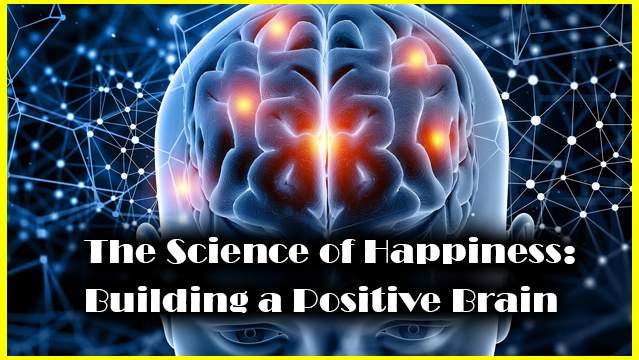The Science of Happiness: Building a Positive Brain
Happiness is a scientifically supported mental state that may be developed with the correct methods; it is not merely an emotion. We can teach the brain to prioritize resilience, happiness, and wellbeing by learning how it interprets emotions. The science of happiness and practical strategies for rewiring your brain for positivity will be discussed in this blog.
The Neuroscience Behind Happiness
Due to the way the human brain is structured to prioritize survival, threats are frequently given more attention than pleasant events. The negative bias is the name given to this phenomenon. However, by deliberately directing our attention toward positive experiences, ideas, and feelings, neuroscience research indicates that we may teach our brain to be optimistic.
The Role of Neurotransmitters in Happiness
Certain brain chemicals, known as neurotransmitters, play a crucial role in our mood and overall sense of well-being.
- Dopamine: Known as the “reward” chemical, dopamine is released when we accomplish tasks or experience pleasure.
- Serotonin: Often called the “feel-good” neurotransmitter, serotonin helps regulate mood and reduce stress.
- Oxytocin: The “love hormone,” oxytocin is associated with social bonding and trust.
- Endorphins: These natural painkillers promote feelings of happiness and relaxation.
By engaging in activities that boost these chemicals, we can enhance our happiness naturally.
How to Train Your Brain for Positivity
-
Practice Gratitude Daily
One of the most effective ways to rewire your brain for happiness is by practicing gratitude. Studies show that focusing on what we are grateful for increases serotonin levels and improves overall mental well-being.
How to Practice Gratitude
- Keep a gratitude journal and write down three things you’re thankful for each day.
- Express appreciation to others through small gestures or kind words.
- Reflect on positive moments before going to bed.
-
Engage in Mindfulness and Meditation
Mindfulness and meditation help train your brain to stay present and reduce negative thought patterns. Research shows that meditation increases gray matter in the brain, improving emotional regulation and stress management.
Simple mindfulness techniques:
- Start with 5-10 minutes of deep breathing exercises daily.
- Focus on your surroundings using the “5-4-3-2-1” technique (identify 5 things you see, 4 things you hear, 3 things you touch, 2 things you smell, and 1 thing you taste).
- Use guided meditation apps like Headspace or Calm.
-
Exercise to Boost Your Mood
Physical activity is one of the most powerful tools for increasing dopamine and endorphin levels. Regular exercise has been proven to reduce symptoms of anxiety and depression while enhancing overall happiness and positivity.
Best Exercises for Happiness:
- Brisk walking or jogging for 30 minutes.
- Yoga and stretching exercises.
- Dancing or any activity that brings joy.
-
Surround Yourself with Positive People
The people we interact with influence our mindset. Being around optimistic and supportive individuals encourages a positive mindset and enhances emotional well-being.
How to Cultivate Positive Social Connections
- Spend time with friends and family who uplift you.
- Join social groups or communities with shared interests.
- Limit exposure to negative influences and toxic relationships.
-
Train Your Brain with Positive Affirmations
Repeating positive affirmations daily helps rewire your brain for positivity by reinforcing constructive thought patterns.
Examples of Positive Affirmations:
- “I am capable and strong.”
- “Happiness flows through me effortlessly.”
- “I attract positive energy and abundance.”
-
Get Quality Sleep
Poor sleep can lead to irritability, stress, and decreased levels of serotonin. Prioritizing good sleep hygiene is essential for maintaining mental health and happiness.
Tips for Better Sleep:
- Maintain a consistent sleep schedule.
- Avoid screens and caffeine before bedtime.
- Create a relaxing bedtime routine.
Conclusion: Rewire Your Brain for Lasting Happiness
The science of happiness proves that positivity is not just a fleeting emotion but a habit that can be nurtured. By practicing gratitude, engaging in mindfulness, exercising, surrounding yourself with positive influences, using affirmations, and prioritizing sleep, you can train your brain for long-term happiness.
Start incorporating these small changes into your daily life and witness the transformation in your mindset and overall well-being. Happiness is within your control—embrace it!


